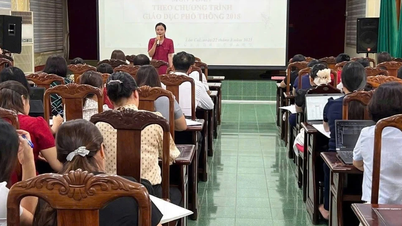Six notable new policies
At the morning meeting on June 22, the 5th session of the 15th National Assembly , the vast majority of National Assembly deputies voted to approve the amended Law on Electronic Transactions. Effective from July 1, 2024, this Law consists of 8 chapters and 53 articles regulating the implementation of transactions by electronic means.
According to the Ministry of Information and Communications , the unit in charge of drafting the revised Law on Electronic Transactions, the Law has 6 notable new policies. Specifically, this Law will help many current laws take effect immediately in the digital environment; any law that has not previously regulated transactions conducted by electronic means will be applied according to the provisions of the Law on Electronic Transactions. Electronic transactions have equivalent value and can be used to replace traditional transactions. Agencies and organizations will not be able to cite the lack of regulations to deny the legal value of electronic transactions.

According to experts, the revised Law on Electronic Transactions can be considered a fundamental law on digital transformation.
Another new policy is to regulate the entire electronic transaction process, optimize, shorten processing time, make it more convenient and can be used to replace traditional transactions. This is an important legal basis to overcome the situation where electronic transactions are more complicated, longer, more expensive and still have to be carried out in parallel with both forms, slowing down the digital transformation process. Regulations on the conversion between paper and electronic are smooth and without barriers.
In particular, the trust service introduced for the first time into the Law plays a role in creating trust and promoting electronic transactions. Electronic certificates are introduced for the first time into the Law to represent all types of licenses, diplomas, certificates, certifications, etc., helping to solve the biggest problem in the entire online public service process, which is the result of handling administrative procedures electronically.
The revised Law on Electronic Transactions also helps to remove difficulties and obstacles in the implementation of electronic contracts, providing a legal basis for Ministers to issue regulations on electronic contracts in their respective sectors and fields under their authority. For example, the Ministry of Labor, Invalids and Social Affairs can issue a Circular on electronic labor contracts, the Ministry of Culture, Sports and Tourism can issue a Circular on electronic tourism contracts....
The revised Law on Electronic Transactions also codifies the role of national digital platforms, which are important coordination tools of the Ministry of Information and Communications, such as the NDXP platform (National Data Sharing Integration Platform - PV), and architectural framework. Previously, we had no legal basis for this activity.
Along with that, legalize the state agencies to hire experts from the annual state budget (business budget) to hire consultants to build databases; carry out technical and professional activities on management, operation, and ensuring network information security for information systems serving electronic transactions of state agencies. This policy initially removes difficulties in using business budget for maintenance and operation.
Another notable policy of the revised Law on Electronic Transactions is data sharing, online monitoring, inspection, and auditing. This policy lays an important legal basis for state management using big data instead of traditional state management; especially data sharing and monitoring of information systems serving electronic transactions.
Creating a clearer and more convenient electronic trading environment
Talking to VietNamNet about the role of the revised Law on Electronic Transactions in the digital transformation in Vietnam, Mr. Vu The Binh, Vice President and General Secretary of the Vietnam Internet Association (VIA), commented that the passing of this Law helps to further improve the legal framework related to digital transformation activities in Vietnam.
“Although the new Law will not take effect until July 2024, and there needs to be specific regulations under the Law for guidance, we believe that the revised Law on Electronic Transactions will help state agencies, businesses and people have a clearer and more convenient electronic transaction environment,” commented Mr. Vu The Binh.
Sharing the same view, Mr. Vu Ngoc Son, an expert with more than 20 years of experience in the field of IT and information security in Vietnam, commented: The revised Law on Electronic Transactions helps to perfect the legal framework for transactions in cyberspace, especially expanding the scope of application of electronic transactions to all activities of social life.

The revised Law on Electronic Transactions will ensure the legal value of electronic transactions.
According to Mr. Vu Ngoc Son's analysis, the 2005 Law on Electronic Transactions is a framework law, mainly principled and not specific, so when implemented in practice recently, there have been many shortcomings. The revised law has overcome the shortcomings, shortcomings and limitations of the current law, such as expanding the scope of regulation, expanding the scope of application to all activities of social life. Especially with the issue of ensuring the legal value of electronic signatures, electronic certification, electronic contracts in particular and the legal value of electronic transactions in general. "It can be said that the revised Law on Electronic Transactions is like a runway for the fields of digital transformation, digital government, digital economy and digital society to take off in the near future," Mr. Vu Ngoc Son emphasized.
Discussing the impact of the revised Law on Electronic Transactions on people and businesses, expert Vu Ngoc Son said that when the Law on Electronic Transactions officially comes into effect, it will contribute to reforming administrative procedures, shortening the process of processing documents, saving time and costs for people and businesses.
According to Vice President and General Secretary of VIA Vu The Binh, the Law corridors will be issued and specified by the Government and relevant ministries and branches; thereby helping people and businesses to trust and be more confident in conducting transactions through electronic forms. Thanks to that, the operating costs of economic activities are also expected to decrease, increasing competitiveness and economic efficiency for businesses, while bringing convenience, optimizing costs and time for people.
Source link



![[Photo] Politburo works with the Standing Committee of Cao Bang Provincial Party Committee and Hue City Party Committee](https://vphoto.vietnam.vn/thumb/1200x675/vietnam/resource/IMAGE/2025/8/28/fee8a847b1ff45188749eb0299c512b2)
![[Photo] National Assembly Chairman Tran Thanh Man holds talks with New Zealand Parliament Chairman](https://vphoto.vietnam.vn/thumb/1200x675/vietnam/resource/IMAGE/2025/8/28/c90fcbe09a1d4a028b7623ae366b741d)

![[Photo] General Secretary To Lam presents the 45-year Party membership badge to comrade Phan Dinh Trac](https://vphoto.vietnam.vn/thumb/1200x675/vietnam/resource/IMAGE/2025/8/28/e2f08c400e504e38ac694bc6142ac331)
![[Photo] Red flag with yellow star flutters in France on National Day September 2](https://vphoto.vietnam.vn/thumb/1200x675/vietnam/resource/IMAGE/2025/8/28/f6fc12215220488bb859230b86b9cc12)
![[Photo] General Secretary To Lam attends the opening ceremony of the National Achievements Exhibition](https://vphoto.vietnam.vn/thumb/1200x675/vietnam/resource/IMAGE/2025/8/28/d371751d37634474bb3d91c6f701be7f)





























































































Comment (0)